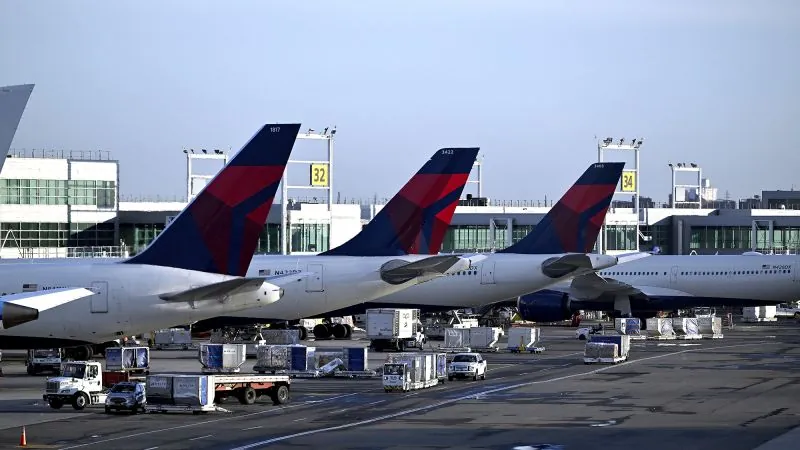
Shocking Security Breach: How a Delta Stowaway Slipped Through Airport Safeguards to Board Flight to Paris
2024-12-05
Author: Ming
Incident Overview
In a startling revelation, a recent incident at New York’s John F. Kennedy International Airport has raised significant concerns about aviation security protocols. A 57-year-old woman, identified as Svetlana Dali, managed to board a Delta Air Lines flight to Paris without a valid boarding pass or proper identification, sparking outrage and calls for immediate reforms within the airline industry.
Expert Commentary
Mary Schiavo, a former inspector general for the U.S. Department of Transportation and CNN aviation analyst, noted that this event exposes critical vulnerabilities in airport security that must be urgently addressed. “This should serve as a wake-up call for the airline industry. It’s a serious matter that reveals our security systems are, once again, dangerously weak,” Schiavo emphasized.
Details of the Breach
The incident occurred on one of the busiest travel days of the year, just before Thanksgiving, with nearly 2.7 million passengers passing through TSA screening. Initial investigations indicate that Dali slipped past an employee in charge of security for airline crew members at JFK’s Terminal 4. She then bypassed the checkpoint where her ID and boarding pass should have been verified, blending in with a family group as they presented their documents.
The stowaway did undergo screening for her carry-on luggage, where TSA agents found two bottles of water but otherwise did not detect any suspicious behavior. Upon the flight's arrival in France, law enforcement officials apprehended her, raising questions about how she evaded scrutiny not just from TSA, but also from Delta gate agents.
Delta's Response
Delta Airlines expressed that they are “thoroughly addressing” this unprecedented breach of procedures, which they described as a deviation from standard security measures. While they maintain that their overall infrastructure is “sound,” specifics regarding the incident were not communicated, leading to further speculation regarding operational weaknesses.
Technological Solutions
The security lapse highlights an urgent need for technological advancements in the industry. TSA Administrator David Pekoske has suggested that implementing electronic gates equipped with facial recognition technology could help prevent similar incidents. “This is a problem we face, and we must find solutions,” Pekoske remarked during an aviation security summit.
Surveillance and Oversight
Schiavo pointed out that airport checkpoints are covered by surveillance cameras, indicating that the authorities already have evidence of the Dali incident. She criticized the system for failing to verify whether Dali was a ticketed passenger, a critical oversight that could have exceptional consequences if exploited by malicious actors.
Legal Proceedings
Dali was returned to New York following her arrest and is expected to undergo questioning by TSA and law enforcement. She faces federal charges for being a stowaway and could potentially face up to five years in prison. Meanwhile, TSA has initiated civil proceedings against her, underscoring the serious implications of this breach.
Context of Repeated Incidents
This isn’t the first instance of stowaway incidents with Delta Airlines this year; a previous case involved a man from Texas who similarly boarded a flight using a photo of another passenger’s boarding pass. Such repeated lapses raise alarm about systemic flaws in passenger screening and overall airport security.
Conclusion and Future Implications
As the investigation unfolds, it is clear that this case not only highlights specific security failures but also poses significant questions about the robustness of America’s aviation infrastructure. “What the world now realizes is that our airline security may be as porous as it was before 9/11,” Schiavo warned, affirming the need for immediate action to safeguard against future threats.


 Brasil (PT)
Brasil (PT)
 Canada (EN)
Canada (EN)
 Chile (ES)
Chile (ES)
 España (ES)
España (ES)
 France (FR)
France (FR)
 Hong Kong (EN)
Hong Kong (EN)
 Italia (IT)
Italia (IT)
 日本 (JA)
日本 (JA)
 Magyarország (HU)
Magyarország (HU)
 Norge (NO)
Norge (NO)
 Polska (PL)
Polska (PL)
 Schweiz (DE)
Schweiz (DE)
 Singapore (EN)
Singapore (EN)
 Sverige (SV)
Sverige (SV)
 Suomi (FI)
Suomi (FI)
 Türkiye (TR)
Türkiye (TR)